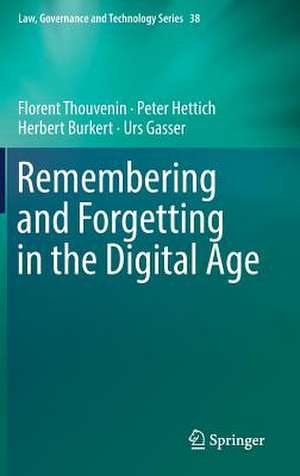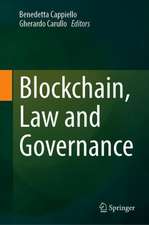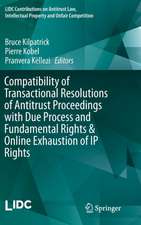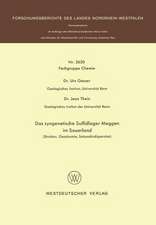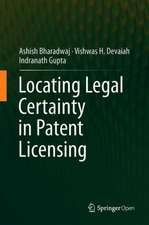Remembering and Forgetting in the Digital Age: Law, Governance and Technology Series, cartea 38
Autor Florent Thouvenin, Peter Hettich, Herbert Burkert, Urs Gasseren Limba Engleză Hardback – 7 sep 2018
The book offers guidelines for legislators as well as private and public organizations on how to make decisions on remembering and forgetting personally identifiable information in the digital age. It draws on three main perspectives: law, based on a comprehensive analysis of Swiss law that serves as an example; technology, specifically search engines, internet archives, social media and the mobile internet; and an interdisciplinary perspective with contributions from various disciplines such as philosophy, anthropology, sociology, psychology, and economics, amongst others.. Thanks to this multifaceted approach, readers will benefit from a holistic view of the informational phenomenon of “remembering and forgetting”.
This book will appeal to lawyers, philosophers, sociologists, historians, economists, anthropologists, and psychologists among many others. Such wide appeal is due to its rich and interdisciplinary approach to the challenges for individuals and society at large with regard to remembering and forgetting in the digital age.
| Toate formatele și edițiile | Preț | Express |
|---|---|---|
| Paperback (1) | 943.57 lei 6-8 săpt. | |
| Springer International Publishing – 20 dec 2018 | 943.57 lei 6-8 săpt. | |
| Hardback (1) | 949.55 lei 6-8 săpt. | |
| Springer International Publishing – 7 sep 2018 | 949.55 lei 6-8 săpt. |
Din seria Law, Governance and Technology Series
- 18%
 Preț: 950.33 lei
Preț: 950.33 lei - 24%
 Preț: 645.10 lei
Preț: 645.10 lei - 20%
 Preț: 691.09 lei
Preț: 691.09 lei - 20%
 Preț: 574.07 lei
Preț: 574.07 lei - 20%
 Preț: 879.80 lei
Preț: 879.80 lei - 20%
 Preț: 878.75 lei
Preț: 878.75 lei - 15%
 Preț: 720.23 lei
Preț: 720.23 lei - 18%
 Preț: 1122.56 lei
Preț: 1122.56 lei - 18%
 Preț: 1130.27 lei
Preț: 1130.27 lei - 15%
 Preț: 642.83 lei
Preț: 642.83 lei - 18%
 Preț: 950.52 lei
Preț: 950.52 lei - 18%
 Preț: 1009.85 lei
Preț: 1009.85 lei - 18%
 Preț: 1115.14 lei
Preț: 1115.14 lei - 15%
 Preț: 653.14 lei
Preț: 653.14 lei - 18%
 Preț: 949.23 lei
Preț: 949.23 lei - 18%
 Preț: 1014.76 lei
Preț: 1014.76 lei - 15%
 Preț: 638.43 lei
Preț: 638.43 lei - 18%
 Preț: 1124.30 lei
Preț: 1124.30 lei - 18%
 Preț: 1124.60 lei
Preț: 1124.60 lei - 18%
 Preț: 999.45 lei
Preț: 999.45 lei - 18%
 Preț: 892.42 lei
Preț: 892.42 lei - 15%
 Preț: 640.37 lei
Preț: 640.37 lei - 18%
 Preț: 947.35 lei
Preț: 947.35 lei - 20%
 Preț: 340.32 lei
Preț: 340.32 lei - 18%
 Preț: 1692.20 lei
Preț: 1692.20 lei - 18%
 Preț: 954.93 lei
Preț: 954.93 lei - 24%
 Preț: 789.36 lei
Preț: 789.36 lei -
 Preț: 397.59 lei
Preț: 397.59 lei - 20%
 Preț: 876.57 lei
Preț: 876.57 lei - 20%
 Preț: 652.41 lei
Preț: 652.41 lei - 18%
 Preț: 900.49 lei
Preț: 900.49 lei - 18%
 Preț: 941.50 lei
Preț: 941.50 lei -
 Preț: 392.97 lei
Preț: 392.97 lei
Preț: 949.55 lei
Preț vechi: 1157.98 lei
-18% Nou
Puncte Express: 1424
Preț estimativ în valută:
181.69€ • 190.72$ • 150.81£
181.69€ • 190.72$ • 150.81£
Carte tipărită la comandă
Livrare economică 10-24 aprilie
Preluare comenzi: 021 569.72.76
Specificații
ISBN-13: 9783319902296
ISBN-10: 3319902296
Pagini: 240
Ilustrații: XVI, 257 p.
Dimensiuni: 155 x 235 mm
Greutate: 0.56 kg
Ediția:1st ed. 2018
Editura: Springer International Publishing
Colecția Springer
Seria Law, Governance and Technology Series
Locul publicării:Cham, Switzerland
ISBN-10: 3319902296
Pagini: 240
Ilustrații: XVI, 257 p.
Dimensiuni: 155 x 235 mm
Greutate: 0.56 kg
Ediția:1st ed. 2018
Editura: Springer International Publishing
Colecția Springer
Seria Law, Governance and Technology Series
Locul publicării:Cham, Switzerland
Cuprins
Part 1. Introduction.- Part 2. Legal Framework.- Storage Obligations.- Disposal Obligations.- Access Restrictions.- Prescription.- 3. Technological Developments.- Search Engines.- Social Media.- Internet Archives.- Mobile Internet.- 4. Interdisciplinary Perspectives.- FORGETTING – In a Digital Glasshouse?; Christine Abbt.- Remembering prevails over Forgetting: Archiving of Personal Data in the Analog and in the Digital Age; Christoph Graf.- Digitalization and social identity formation – A Sociological Point of View; Matthias Klemm.- The Digital Age and the Social Imaginary; Melinda Sebastian and Wesley Shumar.- On the economics of remembering and forgetting in the digital age; Mark Schelker.- A Political Economic Analysis of Transparency in a Digital World; Christine Benesch.- The Role of Temporal Construal in Online Privacy behaviours; Johannes Ullrich.- Remembering (to) Delete, Forgetting Beyond Informational Privacy; Viktor Mayer-Schönberger.- Longevity: Impact on Remembering and Forgetting; Domenico Salvati.- On the Interplay between Forgetting and Remembering; Nikos Akitas.- Part 5. Design Guide.
Notă biografică
Prof. Dr. Florent Thouvenin is an Associate Professor of Information and Communications Law at the University of Zurich. He is the co-founder and co-chair of the Executive Committee of the Center for Information Technology, Society, and Law (ITSL) at the University of Zurich and the Executive Director of the Swiss Forum of Communication Law (SF-FS).
Prof. Dr. Herbert Burkert is a Steering Committee Member of the Digital Asia Hub and President of the Research Center for Information Law at the University of St. Gallen (Switzerland) where he taught public law as well as information and communication law. His research interests include law as Information and its role in regulating information flows in society, information technology as object and driver of regulation, and data protection and access to information regimes.
Prof. Dr. Urs Gasser is the Executive Director of the Berkman Center for Internet & Society at Harvard University and aProfessor of Practice at Harvard Law School. He is a visiting professor at KEIO University (Japan) and also teaches at Fudan University School of Management (China). Urs Gasser’s research and teaching activities focus on information law, policy, and society issues.
Prof. Dr. Peter Hettich is Professor of Public Law at the University of St. Gallen where he also serves as a Director of the Institute of Public Finance, Fiscal Law and Law and Economics. His research interests include constitutional protections of economic freedoms and regulated markets, administrative law, competition law, construction and environmental law, infrastructure regulation and the law of public companies. He acts as Of Counsel to the Swiss law firm VISCHER in Zurich.
Textul de pe ultima copertă
This book examines the fundamental question of how legislators and other rule-makers should handle remembering and forgetting information (especially personally identifiable information) in the digital age. It encompasses such topics as data protection, collective memory, privacy and the right to be forgotten when considering data storage and deletion. The authors argue in support of maintaining the new digital default, that (personally identifiable) information should be remembered rather than forgotten.
The book offers guidelines for legislators as well as private and public organizations on how to make decisions on remembering and forgetting personally identifiable information in the digital age. It draws on three main perspectives: law, including the example of Swiss legal provisions; technology, specifically search engines, internet archives, social media and the mobile internet; and an interdisciplinary perspective from philosophy, the social sciences andarchiving science among other disciplines. Readers will benefit from a holistic view of the informational phenomenon of “remembering and forgetting”. This book will appeal to economists, lawyers, philosophers, sociologists, historians, anthropologists, and psychologists among many others. Such wide appeal is due to its rich and interdisciplinary approach to the challenges for individuals and society at large with regard to this aspect of human experience in the digital age.
The book offers guidelines for legislators as well as private and public organizations on how to make decisions on remembering and forgetting personally identifiable information in the digital age. It draws on three main perspectives: law, including the example of Swiss legal provisions; technology, specifically search engines, internet archives, social media and the mobile internet; and an interdisciplinary perspective from philosophy, the social sciences andarchiving science among other disciplines. Readers will benefit from a holistic view of the informational phenomenon of “remembering and forgetting”. This book will appeal to economists, lawyers, philosophers, sociologists, historians, anthropologists, and psychologists among many others. Such wide appeal is due to its rich and interdisciplinary approach to the challenges for individuals and society at large with regard to this aspect of human experience in the digital age.
Caracteristici
Challenges long-established but questionable principles of data protection law that are unfit for the digital age Covers topics of remembering and forgetting, data protection and privacy from a holistic, future-oriented and interdisciplinary approach Analyzes the present legal framework with a view to shaping future legislation, considering how legislators and rule-makers should approach today’s data
